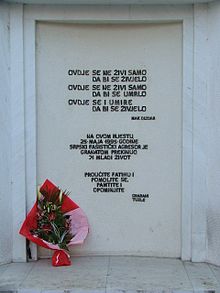- Mak Dizdar
-
Mehmedalija Dizdar Born October 17, 1917
Stolac, Bosnia and Herzegovina, Austro-Hungarian EmpireDied July 16, 1971 (aged 53)
Sarajevo, SR Bosnia and Herzegovina, Socialist Federal Republic of YugoslaviaOccupation Poet Mehmedalija "Mak" Dizdar (17 October 1917 - 16 July 1971) was one of the greatest Bosnian and Yugoslav[1] poets of the second half of the 20th century.
Contents
Biography
Mehmedalija Mak Dizdar was born to a Bosniak family in Stolac, Bosnia and Herzegovina in 1917.[2] In 1936, Dizdar relocated to Sarajevo where he attended and graduated from the Gymnasium. Dizdar spent his World War II years as a supporter of the Communist Partisans. He moved frequently from place to place in order to avoid the NDH authorities' attention.
After the war, Dizdar was a prominent figure in the cultural life of Bosnia and Herzegovina, working as the editor-in-chief of the daily Oslobođenje (Liberation). He served as head of a few state-sponsored publishing houses and eventually became a professional writer and the President of the Writers' Union of Bosnia and Herzegovina, a post he held until his death.
Work
 A poem by Mak Dizdar on the memorial of the Tuzla massacre: "Ovdje se ne živi samo da bi se živjelo. Ovdje se ne živi samo da bi se umrlo. Ovdje se i umire da bi se živjelo."
A poem by Mak Dizdar on the memorial of the Tuzla massacre: "Ovdje se ne živi samo da bi se živjelo. Ovdje se ne živi samo da bi se umrlo. Ovdje se i umire da bi se živjelo."
Dizdar's two poetry collections and series of longer poems, Kameni spavač ("Stone sleeper") (1966–1971) and Modra rijeka (1971), fused seemingly disparate elements. He drew inspiration from pre-Ottoman Bosnian Christian culture, from the sayings of heterodox Islamic visionary mystics, and from the 15th century Bosnian vernacular linguistic idiom. His poetry referenced medieval Bosnian tombstones ("stećci" or "mramorovi" - marbles) and their gnomic inscriptions on the ephemerality of life. It articulated a distinctive vision of life and death, drawing on Christian and Muslim Gnostic sensibilities of life as a passage between "tomb and stars", expressing both the Gnostic horror of corporeality and a sense of the blessedness of the universe.
Mak Dizdar also fought against the forced influence of the Serbian language on the Bosnian language, as Dizdar called it, in his article "Marginalije o jeziku i oko njega", Zivot, XIX/11 - 12, Sarajevo, 1970, 109-120.
After the collapse of Communism and following the war in Bosnia and Herzegovina, Dizdar's poetic magnum opus has remained the cornerstone of modern Bosnia-Herzegovina literature.
References
- ^ Jones, Francis R. (2004). "Ethics, Aesthetics and Décision: Literary Translating in the Wars of the Yugoslav Succession". Meta: Translators' Journal 49 (4): 711–728.
- ^ Shatzmiller, Maya (2002). Islam and Bosnia: Conflict Resolution and Foreign Policy in Multi-Ethnic States. McGill-Queen's University Press. p. 35. ISBN 0773524134.
External links
- Mak Dizdar Foundation
- Rusmir Mahmutćehajić, "On the Poetry of Mak Dizdar: The Poet, the Road, and the Word", Telos 156 (Fall 2011): 131-52.
Categories:- 1917 births
- 1971 deaths
- People from Stolac
- Bosnia and Herzegovina writers
- Bosnia and Herzegovina poets
- Bosniaks of Bosnia and Herzegovina
- Bosniak writers
- Bosniak poets
- Croatian Muslims
- Croats of Bosnia and Herzegovina
- Croatian writers
- Croatian poets
- Yugoslav writers
- Yugoslav poets
- Bosnia and Herzegovina people stubs
Wikimedia Foundation. 2010.
